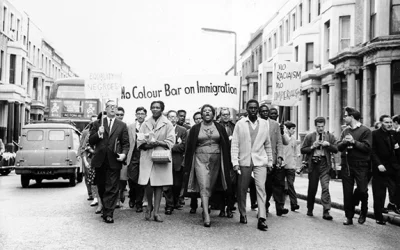On 1 July 1962, the Commonwealth Immigrants Act came into effect, ending the automatic right of people of the British Commonwealth and Colonies to settle in the United Kingdom.
The Act applied stringent restrictions on the entry of Commonwealth citizens into Britain. Only those with work permits (which were typically only for high-skilled workers, such as doctors) would be allowed entry.
This was pushback against the Windrush generation and non-white colonial citizens of Britain. Before the Act was passed, citizens of Commonwealth countries had extensive rights to migrate to the UK. There was widespread opposition to immigration in Britain from a variety of political groups, including the Conservative Monday Club, whose members of Parliament were very active and vocal in their opposition to mass immigration.
The wording of the act
An Act to make temporary provision for controlling the immigration into the United Kingdom of Commonwealth citizens; to authorise the deportation from the United Kingdom of certain Commonwealth citizens convicted of offences and recommended by the court for deportation; to amend the qualifications required of Commonwealth citizens applying for citizenship under the British Nationality Act, 1948; to make corresponding provisions in respect of British protected persons and citizens of the Republic of Ireland and for purposes connected with the matters aforesaid.
Trinidad-born activist Claudia Jones, who campaigned against the 1962 Commonwealth Immigration Act, wrote an opinion piece in the West Indian Gazette where she stated that the Act “established a second class citizenship status for West Indians and other Afro-Asian peoples in Britain.” She predicted that if it passed, the Act “could be the death knell of the Commonwealth.”
The Immigration Act didn’t do much to stop the arrival of black people. Instead, as Claudia Jones predicted, it created “divisions between white and coloured workers and people”, providing the “green light to racialism, to racial prejudice in theory and practice”






Leave a Reply